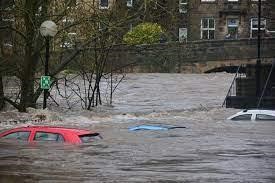
Article by Deborah Murphy
Rising Climate Anxiety Amongst the Young.
Eco- or Climate Anxiety is a growing phenomenon. According to an article by Jonathan Webb and Denis Campbell (The Guardian: 20.11.21) ‘more than half of child and adolescent psychiatrists in England are seeing patients distressed about the state of the environment.’ As alarming images of forest fires, flooding and wild weather flood our media platforms and news outlets zoom in on the forthcoming COP26 conference in Glasgow it would not be surprising to see a continued rise in these figures.
The Young Feel Unheard by Adults.
Many adults trying to do their bit to reduce their carbon footprint will have known those dreadful moments when it all seems too little too late. Who hasn’t felt helpless in the face of the climate challenge? Imagine then how disempowered the young feel. In March 2019, the teenage activist Greta Thunberg inspired her peers to participate in the ‘Fridays for Future’ campaign. 1.6 million school-age protesters from 125 different countries walked out of their classrooms demanding that world leaders act to protect the planet. Despite this powerful message they were told to get back to school and then saw the leader of the Western World, one of the most powerful men on the planet, dismiss their spokesperson, Greta Thunberg via Twitter telling her to “go and watch a good old-fashioned movie’ and ‘Chill, Greta. Chill’.
Children are losing sleep.
In March 2020, Children’s BBC Newsround conducted a survey hoping to discover just how children and young adults are reacting to the climate crisis. It revealed that
‘More than 2 in 5 young people don’t trust adults to tackle the challenges of climate change.’
‘Nearly 2 in 3 children don’t think people in power are listening to young people.’
The survey also found that 73% of those surveyed were worried about the state of the planet and the impact climate change will have on their lives whilst 1 in 5 children have had their sleeping or eating habits affected by their worries.
Source: Savanta-Comres survey for BBC Newsround of 2,000 8-16 year olds.
So how can you help the young people in your life navigate the complexities of our times?
1. Recognise their concerns.
According to Elizabeth Haas (Chair of Committee on Climate Change and Mental Health for American Psychiatric Research) it is important to avoid invalidating their anxiety with a well-meaning ‘Don’t worry”. Help them to understand that their concern about the planet and its animals is the natural response of a caring person. Acknowledge their concerns.
2. Help them to become informed and to pivot their knowledge towards the positive action taking place.
- Head to the Library. There are lots of positive books out there for all ages. Your librarian will help you choose books which inform and suggest ways to get involved.
- Use the Internet. Websites such as the Newsround page on the BBC site will give well-balanced information and ideas. Reading these together can spark conversations.
- Join clubs and attend events. Look out for local groups such as the wildlife trusts who run events for young people where they can meet and talk to their peers.
Finding out more about the positive actions taken by thousands of individuals and groups world -wide will help to reassure your young person that their actions contribute to the whole which adds up to something powerful.
3. Support them in getting involved in activities that let them make a difference.
- Help them to organise a litter pick.

- Get them involved with growing their own vegetables.
- Help them grow a bee-friendly garden.
- Spend time in nature.
- Teach them how to repair things.
- Help them use less plastic.
- Take them walking or cycling.
- Try some vegetarian meals and let them help you cook.
Most importantly, listen to their ideas and give them a go. Try to incorporate their solutions into your family routine.
4. Let them know that you are prepared.
 Seeing images of homes under water in towns not far from where you live, or pictures of people who are fleeing from fires being rescued off the beaches of a country you have been on holiday in can be a cause of anxiety for a young mind. They will feel better if they know that you are prepared. Sometimes anxiety may relate to their pets, friends or relatives too.
Seeing images of homes under water in towns not far from where you live, or pictures of people who are fleeing from fires being rescued off the beaches of a country you have been on holiday in can be a cause of anxiety for a young mind. They will feel better if they know that you are prepared. Sometimes anxiety may relate to their pets, friends or relatives too.
Finally, why not do the Newsround survey with your child and find out what they are thinking about climate change? They might just have some great solutions too.
Click the link here to complete the BBC Newsround survey with you child.
Let us know what you think of our blog posts and newsletters and please feel free to share them with your family, friends and contacts.


Recent Comments